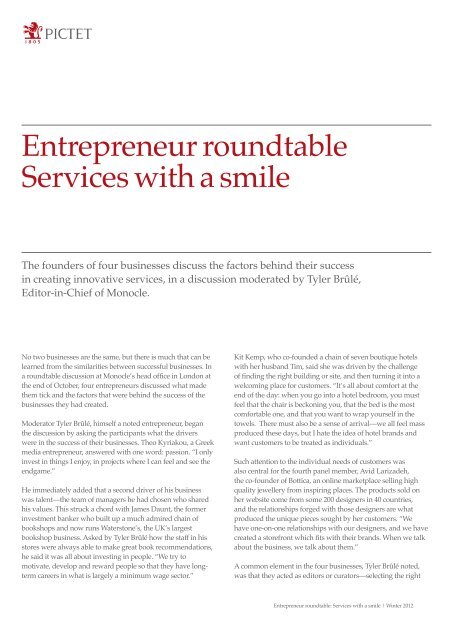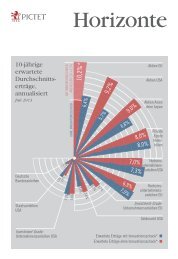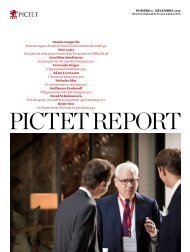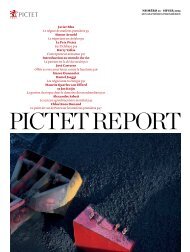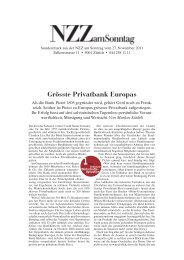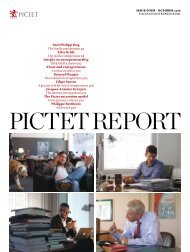Entrepreneur roundtable Services with a smile - Perspectives Pictet
Entrepreneur roundtable Services with a smile - Perspectives Pictet
Entrepreneur roundtable Services with a smile - Perspectives Pictet
Create successful ePaper yourself
Turn your PDF publications into a flip-book with our unique Google optimized e-Paper software.
<strong>Entrepreneur</strong> <strong>roundtable</strong><br />
<strong>Services</strong> <strong>with</strong> a <strong>smile</strong><br />
The founders of four businesses discuss the factors behind their success<br />
in creating innovative services, in a discussion moderated by Tyler Brûlé,<br />
Editor-in-Chief of Monocle.<br />
No two businesses are the same, but there is much that can be<br />
learned from the similarities between successful businesses. In<br />
a <strong>roundtable</strong> discussion at Monocle’s head office in London at<br />
the end of October, four entrepreneurs discussed what made<br />
them tick and the factors that were behind the success of the<br />
businesses they had created.<br />
Moderator Tyler Brûlé, himself a noted entrepreneur, began<br />
the discussion by asking the participants what the drivers<br />
were in the success of their businesses. Theo Kyriakou, a Greek<br />
media entrepreneur, answered <strong>with</strong> one word: passion. “I only<br />
invest in things I enjoy, in projects where I can feel and see the<br />
endgame.”<br />
He immediately added that a second driver of his business<br />
was talent—the team of managers he had chosen who shared<br />
his values. This struck a chord <strong>with</strong> James Daunt, the former<br />
investment banker who built up a much admired chain of<br />
bookshops and now runs Waterstone’s, the UK’s largest<br />
bookshop business. Asked by Tyler Brûlé how the staff in his<br />
stores were always able to make great book recommendations,<br />
he said it was all about investing in people. “We try to<br />
motivate, develop and reward people so that they have longterm<br />
careers in what is largely a minimum wage sector.”<br />
Kit Kemp, who co-founded a chain of seven boutique hotels<br />
<strong>with</strong> her husband Tim, said she was driven by the challenge<br />
of finding the right building or site, and then turning it into a<br />
welcoming place for customers. “It’s all about comfort at the<br />
end of the day: when you go into a hotel bedroom, you must<br />
feel that the chair is beckoning you, that the bed is the most<br />
comfortable one, and that you want to wrap yourself in the<br />
towels. There must also be a sense of arrival—we all feel mass<br />
produced these days, but I hate the idea of hotel brands and<br />
want customers to be treated as individuals.”<br />
Such attention to the individual needs of customers was<br />
also central for the fourth panel member, Avid Larizadeh,<br />
the co-founder of Bottica, an online marketplace selling high<br />
quality jewellery from inspiring places. The products sold on<br />
her website come from some 200 designers in 40 countries,<br />
and the relationships forged <strong>with</strong> those designers are what<br />
produced the unique pieces sought by her customers. “We<br />
have one-on-one relationships <strong>with</strong> our designers, and we have<br />
created a storefront which fits <strong>with</strong> their brands. When we talk<br />
about the business, we talk about them.”<br />
A common element in the four businesses, Tyler Brûlé noted,<br />
was that they acted as editors or curators—selecting the right<br />
<strong>Entrepreneur</strong> <strong>roundtable</strong>: <strong>Services</strong> <strong>with</strong> a <strong>smile</strong> | Winter 2012
choices for individual customers in<br />
marketplaces <strong>with</strong> a multiplicity<br />
of products. James Daunt said this<br />
curating role was central to his bookselling<br />
business: “Some bookshops<br />
sold the best display places to the<br />
publishers, so the selection process<br />
effectively disappeared. In my own<br />
shops, I aimed to restore the art of<br />
curation—to draw people into the<br />
shops and thus to sell more books.”<br />
Avid Larizadeh said that her business<br />
was also highly curated. “There are<br />
objective criteria based on quality<br />
and certain standards, and subjective<br />
criteria such as the need to have an<br />
inspiring story behind a piece. But<br />
it’s not just my taste: we have a team<br />
of style-hunters who travel the world<br />
and some of them will select pieces<br />
that would not have been my choice.”<br />
Had social media changed the<br />
programmes produced by Theo<br />
Kyriakou’s Antenna media group,<br />
asked Tyler Brûlé? “Is it down to who<br />
is making the programmes, or is it<br />
the pull of the crowd through online<br />
messages and tweeting?”<br />
Social media were an unstoppable<br />
power, Mr Kyriakou said, and his<br />
group had invested in both Facebook<br />
and Twitter. “But the media business<br />
is still nothing more than content<br />
distribution—the best content <strong>with</strong><br />
the best brands through the best<br />
distribution network to reach the<br />
viewers. Our editors are always<br />
customer-oriented, of course: people<br />
change their habits and their media<br />
consumption, and you have to be there<br />
before the competitors.”<br />
Bottica also evolved its business<br />
model, said Avid Larizadeh, to reflect<br />
developments in online browsing<br />
behaviour. But it would not turn into<br />
what Tyler Brûlé described as “a grand<br />
souk” in London or Paris: “It wouldn’t<br />
make sense. Our business model is<br />
based on holding no inventory and<br />
we couldn’t be global if we did that.<br />
The whole point is that you can get<br />
something from the other end of the<br />
world <strong>with</strong>out going there.”<br />
2<br />
For James Daunt, the changing nature<br />
of the global marketplace in books<br />
posed an awkward problem. “You<br />
can get exactly the same product I’m<br />
selling from Amazon and prices are<br />
always driven down to the lowest<br />
common denominator. We don’t own<br />
the content, and Amazon is now trying<br />
to publish its own books to own the<br />
content. It will be interesting to see<br />
whether book retailers seek to follow<br />
suit—if they do, it will be back to the<br />
future: Victorian booksellers were also<br />
publishers.”<br />
When it came to questions from the<br />
audience, the entrepreneurs were<br />
asked what they would define as great<br />
service. Kit Kemp’s answer was that<br />
it is all about people wanting to come<br />
back. “When people travel, they are<br />
often tired and people take 24 hours to<br />
get to know the hotel. It’s a matter of<br />
taking something they are not used to<br />
and turning it around so they enjoy it<br />
and become a friend who believes in<br />
the place.”<br />
Tyler Brûlé asked her about the<br />
honesty bars in Firmdale hotels— fully<br />
stocked bars in a public space <strong>with</strong> a<br />
<strong>Entrepreneur</strong> <strong>roundtable</strong>: <strong>Services</strong> <strong>with</strong> a <strong>smile</strong> | Winter 2012<br />
notebook for people to record what<br />
they had taken. “The reasoning,” Kit<br />
Kemp said, “was that if you’ve been<br />
to the theatre or are going somewhere<br />
and you want a drink, you can serve<br />
yourself, as if you were entertaining<br />
at home. Some people make a great<br />
show of signing the book, but you’re<br />
also going to find those who have half<br />
a bottle of vodka in their pocket—and<br />
I think that’s quite funny!”<br />
“The media business is still nothing<br />
more than content distribution—the<br />
best content <strong>with</strong> the best brands<br />
through the best distribution network<br />
to reach the viewers.”<br />
Theo Kyriakou, CEO of Antenna<br />
“If you’ve got all those, everything else<br />
can still go wrong and you’re OK.”<br />
Theo Kyriakou said that in free-toair<br />
television, his clients were the<br />
advertisers. “We must attract the<br />
audience, the eyeballs, and deliver the<br />
demographics advertisers need at the<br />
right time. As television becomes more<br />
competitive <strong>with</strong> more stations, you<br />
need to be closer to the client and to<br />
deliver every single day.”
For Avid Larizadeh, good service<br />
was something that made customers<br />
recommend the business to friends<br />
or colleagues. “It’s the emotional<br />
connection you create <strong>with</strong> customers<br />
by talking to them or delighting<br />
them <strong>with</strong> their user experience. It<br />
is easy to find any kind of goods or<br />
services today, and customers will not<br />
remember you unless you create that<br />
connection.”<br />
That word of mouth was also the best<br />
marketing tool, Avid Larizadeh said<br />
when asked about the most effective<br />
form of marketing. “But when you<br />
want to expand, you have to work out<br />
which channels work best for you—<br />
for us, direct mailing our customer<br />
base or search engine optimisation.<br />
We do very little offline marketing:<br />
advertising in some magazines will<br />
sell depending on position and<br />
accompanying editorial, but 90 per<br />
cent of our marketing is online.”<br />
James Daunt agreed on the importance<br />
of word of mouth, in his case helped<br />
by friendly columnists and other<br />
media writers plugging the chain he<br />
founded. A member of the audience<br />
said she thought his best marketing<br />
tool was the iconic linen Daunt bag<br />
produced by fair trade methods in<br />
India—“the greatest thing you did.”<br />
The best marketing tool for Kit Kemp<br />
was what people wrote about her<br />
hotels in the press. “Also having the<br />
best website so everyone can see the<br />
rooms and everything that’s going on.<br />
Advertising doesn’t add up to a row of<br />
beans.”<br />
The problem for Theo Kyriakou was<br />
that the launch of a new television<br />
station could not be advertised<br />
on competitors’ channels. “So it’s<br />
newspapers, magazines, radio and a<br />
lot of outdoor advertising.”<br />
The entrepreneurs admitted there had<br />
been times when they had had fears over<br />
the future of their businesses. But there<br />
was an interesting divergence of opinion<br />
when asked whether they planned to<br />
hand them on to the next generation or<br />
sell them to professional managers.<br />
The youthful Avid Larazadeh’s answer<br />
was shortest: “I have no idea—I<br />
haven’t even thought about it yet!”<br />
“It’s the emotional connection you<br />
create <strong>with</strong> customers by talking to<br />
them or delighting them <strong>with</strong> their<br />
user experience.”<br />
Avid Larizadeh, CEO of Bottica<br />
The equally youthful Theo Kyriakou,<br />
however, had given it some thought.<br />
“Some entrepreneurs see their<br />
businesses as an extension of their<br />
lives and want to have it extended<br />
to the next generation. Like my<br />
ancestors such as Alexander the Great<br />
who put up statues of themselves and<br />
named cities after them to perpetuate<br />
their names. It’s a great way to<br />
overcome the idea of death, but in my<br />
humble view, businesses are different<br />
from life. What you pass to your kids<br />
is your values and a good education.<br />
Businesses should be run by those<br />
who can manage them best, whether<br />
it’s management or shareholders.”<br />
James Daunt, in his late forties and<br />
admitting to a few grey hairs, saw<br />
a European divide on the issue. “I<br />
come from a traditional Anglo-Saxon<br />
world where friends of my age are<br />
all busy selling their businesses—<br />
succession involves handing on<br />
3
the cash. But <strong>with</strong> continental European colleagues,<br />
they want to pass on the business. I was recently<br />
introduced by an Italian to the next managing director<br />
who happened to be six—I admire that approach<br />
enormously and a huge strength comes from that.”<br />
But the contrarian view came from Kit Kemp, whose<br />
daughter was in the audience. “I don’t want to sell<br />
anything, because all you do is hand it to the taxman.<br />
I want to pass it on, and I want to pass on a business<br />
which I haven’t taken anything out of and which is<br />
bigger than what we started <strong>with</strong>. I want our tiny<br />
squidgy empire to go on for several generations and<br />
hopefully get bigger still.”<br />
To which Tyler Brûlé said “Bravo”.<br />
The following entrepreneurs participated<br />
in the discussion:<br />
4<br />
Tyler Brûlé has launched two<br />
groundbreaking print titles in<br />
Wallpaper* and Monocle, and is<br />
currently Editor-in-Chief of the<br />
latter. Brûlé is also the founder<br />
and chairman of the design agency<br />
Winkreative.<br />
James Daunt opened his first shop<br />
in 1990 at the age of 26. Since<br />
then, his small, independent chain<br />
has built a loyal following. Mr. Daunt<br />
is now boss of the UK's largest and<br />
only surviving national book chain,<br />
Waterstone's (300 shops).<br />
Avid Larizadeh is co-founder of<br />
Boticca, an online marketplace that<br />
connects the world’s most talented,<br />
independent fashion accessories<br />
designers directly <strong>with</strong> customers<br />
seeking exquisite, unique pieces<br />
from inspiring places.<br />
Kit Kemp is the co-founder of<br />
Firmdale Hotel Group, which she<br />
started in 1986 <strong>with</strong> her husband.<br />
It now comprises a collection of<br />
seven stylish boutique hotels, six in<br />
London and one in New York."<br />
Theodore Kyriakou is a ship-owner<br />
and a principal shareholder as well<br />
as Group Chief Executive Officer<br />
of the Antenna Group. The Antenna<br />
Group is a privately owned media<br />
and entertainment group.<br />
<strong>Entrepreneur</strong> <strong>roundtable</strong>: <strong>Services</strong> <strong>with</strong> a <strong>smile</strong> | Winter 2012<br />
PICTeT & CIe<br />
This is the latest in a series of <strong>roundtable</strong>s in which <strong>Pictet</strong><br />
& Cie brings together a group of entrepreneurs to discuss<br />
matters concerning them directly. The objective is to create a<br />
community of interests in which some of the leading players<br />
in the business world share their experience, producing<br />
added value for all participants. These entrepreneur<br />
<strong>roundtable</strong>s are thus held at regular intervals on a different<br />
specific topic each time.<br />
<strong>Entrepreneur</strong>ship lies at the heart of <strong>Pictet</strong>’s values. The<br />
bank, organised as a limited partnership, is owned and<br />
managed by eight Partners who share joint and unlimited<br />
liability for its commitments. The Partners thus act as<br />
managers, shareholders and the board of directors. With this<br />
entrepreneurial spirit forming the basis for its growth, <strong>Pictet</strong><br />
& Cie currently has almost 3,000 employees, 22 offices, and<br />
assets under management and custody of CHF 364 billion<br />
(end- September 2011). It is also ranked among the largest<br />
independent asset management institutions in Europe.


